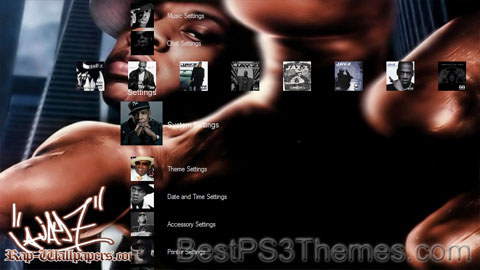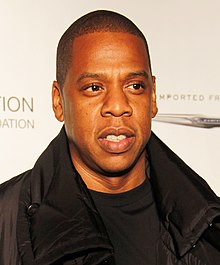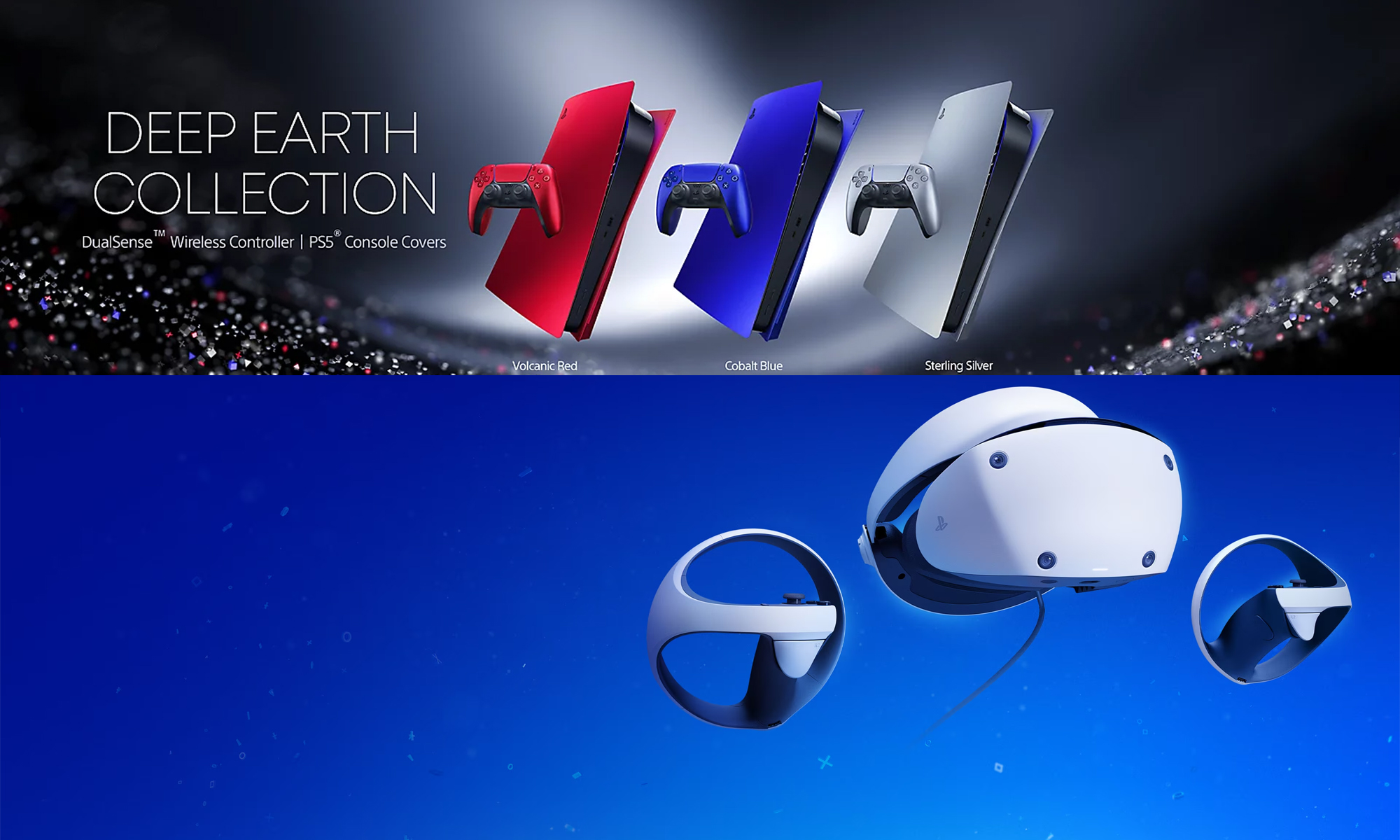Jay-Z theme by xstat32x
Download: JayZ.p3t

(10 backgrounds)
Jay-Z | |
|---|---|
 Jay-Z in 2011 | |
| Born | Shawn Corey Carter December 4, 1969 New York City, U.S. |
| Other names |
|
| Occupations |
|
| Years active | 1986–present[2][3][4] |
| Works | |
| Spouse | |
| Children | 3, including Blue Ivy |
| Awards | Full list |
| Musical career | |
| Genres | East Coast hip hop |
| Labels | |
| Member of | The Carters |
| Formerly of | |
| Website | lifeandtimes |
Shawn Corey Carter (born December 4, 1969), known professionally as Jay-Z,[a] is an American rapper and entrepreneur.[8][9][10] Born and raised in New York City, he was named the greatest rapper of all time by Billboard and Vibe in 2023.[11] He served as the president and chief executive officer of Def Jam Recordings from 2004 to 2007 before founding the entertainment company, Roc Nation the following year.[12]
As a protégé of fellow New York City-based rapper Jaz-O, Jay-Z began his musical career in the late 1980s; he co-founded the record label Roc-A-Fella Records in 1994 to release his first two studio albums Reasonable Doubt (1996) and In My Lifetime, Vol. 1 (1997), both of which were met with critical acclaim. His following albums, including The Blueprint (2001), The Black Album (2003), American Gangster (2007), and 4:44 (2017) each debuted atop the Billboard 200; Jay-Z holds the record for the most number-one albums (14) of any solo artist on the chart.[13][14][15] He has also released the collaborative albums The Best of Both Worlds (2002) and Unfinished Business (2004) with singer R. Kelly,[16] Collision Course (2004) with Linkin Park, Watch the Throne (2011) with Kanye West, and Everything Is Love (2018) with his wife Beyoncé.[17] He peaked the Billboard Hot 100 on four occasions with his guest performances on the singles "Heartbreaker" by Mariah Carey, "Crazy in Love" by Beyoncé, "Umbrella" by Rihanna, and his first to do so as a lead artist, "Empire State of Mind" (with Alicia Keys).[18]
Through his business ventures, Jay-Z became the first hip-hop billionaire in 2019.[19][20] In 1999, he co-founded the clothing retailer Rocawear[21] and later founded the 40/40 Club, a luxury bar chain, in 2003. As both grew into multi-million-dollar businesses, he launched Roc Nation, a multi-disciplinary entertainment agency in 2008. In 2015, he acquired the technology company Aspiro and led the expansion of Tidal, the company's media streaming service.[22][23][24] As of 2024, he is the wealthiest musical artist in the world with a net worth of US$2.5 billion.[25]
One of the world's best-selling music artists with 140 million records sold, Jay-Z has won 24 Grammy Awards, the tenth-most of all time and most awarded for any hip hop artist jointly with Kanye West.[26] He has been awarded the NAACP's President's Award, a Primetime Emmy Award, a Sports Emmy Award, and been nominated for a Tony Award. Ranked by Billboard and Rolling Stone as one of the 100 greatest artists of all time,[27][28] Jay-Z was the first rapper to be inducted into the Songwriters Hall of Fame[29] and the first solo living rapper inducted in the Rock and Roll Hall of Fame. Time named him one of the 100 most influential people in the world in 2013.[8]
Early life and education[edit]
Shawn Corey Carter was born on December 4, 1969, in Brooklyn, New York City.[30] He was raised in Marcy Houses, a public housing project in Brooklyn's Bedford–Stuyvesant neighborhood.[31] His father, Adnis Reeves,[32] abandoned the family, and Jay-Z and his three older siblings were raised by his mother, Gloria Carter. Reeves later met and reconciled with Jay-Z prior to his death in 2003. Jay-Z claims in his lyrics that in 1982, at age 12, he shot his older brother in the shoulder for stealing his jewelry.[33][34]
He attended Eli Whitney High School and George Westinghouse Career and Technical Education High School, both in Brooklyn, and then Trenton Central High School in Trenton, New Jersey. He did not graduate, dropping out during his sophomore year at Trenton Central High School.[35] According to his interviews and lyrics, he sold crack cocaine[34] and was shot at three times during this period.[33] His former friend was sentenced to prison for possessing drugs and weapons.[36][37] Known as "Jazzy" around the neighborhood, he later adopted the stage name "Jay-Z" in homage to his mentor Jaz-O.[31][38]
Career[edit]
Jay-Z can be briefly heard on several of Jaz-O's early recordings in the late 1980s and early 1990s, including "H. P. Gets Busy", "The Originators" and "Hawaiian Sophie".[39][40] Jay-Z became embroiled in several battles with rapper LL Cool J in the early 1990s.[41] He first became known to a wide audience on the posse cut "Show and Prove" on the 1994 Big Daddy Kane album Daddy's Home. Jay-Z has been referred to as Big Daddy Kane's hype man during this period,[42] although Kane explains that he did not fill the traditional hype man role, and was instead basically making cameo appearances on stage. "When I would leave the stage to go change outfits, I would bring out Jay-Z and Positive K and let them freestyle until I came back to the stage."[43][44]
According to his second verse on "99 Problems", released in 2003, Jay-Z was allegedly stopped by an NYPD detective in 1994 while en route to I-95, possibly for a search of drugs in his car. Detection dogs were called, but another police car had passed; Jay-Z was let go soon after.[45] Jay-Z appeared on a popular song by Big L, "Da Graveyard", and on Mic Geronimo's "Time to Build", which also featured early appearances by his former Murder Inc. colleagues Ja Rule and DMX in 1995. His first official rap single was "In My Lifetime", which was released with an accompanying music video in 1995. An unreleased music video was also produced for the B-side "I Can't Get with That."[46]
1995–2000: Reasonable Doubt, In My Lifetime, Vol. 1, Vol. 2..., Vol. 3..., and The Dynasty[edit]
With no major label to give him a record deal, Jay-Z sold burned CDs out of his car,[33] and with Damon "Dame" Dash and Kareem "Biggs" Burke, created Roc-A-Fella Records as an independent label in 1995. After striking a distribution deal with Priority, Jay-Z released his 1996 debut album Reasonable Doubt with beats from acclaimed producers such as DJ Premier and Super DJ Clark Kent and an appearance by The Notorious B.I.G. The album reached number 23 on the Billboard 200, and was generally favored by critics.[31] This album would later be included in Rolling Stone's 500 Greatest Albums of All Time as No. 248 and eventually reach platinum status.[47] After reaching a new label distribution deal with Def Jam in 1997, Jay-Z released his follow-up In My Lifetime, Vol. 1. Featuring production by Sean "Puff Daddy" Combs, DJ Premier, and Ski, it earned platinum status in the United States.[47]
In 1998, Jay-Z released Vol. 2... Hard Knock Life which spawned the biggest hit of his career at the time, "Hard Knock Life (Ghetto Anthem)". He relied more on flow and wordplay, and he continued with his penchant for mining beats from the popular producers of the day such as Swizz Beatz, an upstart in-house producer for Ruff Ryders, and Timbaland.[48] Other producers included DJ Premier, Erick Sermon, The 45 King, and Kid Capri. Charting hits from this album included "Can I Get A...", featuring Ja Rule and Amil, and "Nigga What, Nigga Who", featuring Amil and Jaz-O. Vol. 2 would eventually become Jay-Z's most commercially successful album; it was certified 5× Platinum in the United States and has to date sold over five million copies.[47] The album went on to win a Grammy Award, although Jay-Z boycotted the ceremony protesting DMX's failure to garner a Grammy nomination and the academy's decision to not broadcast urban music categories.[49] In 1999, Jay-Z collaborated with Mariah Carey on "Heartbreaker", a song from her seventh album, Rainbow. The song became Jay-Z's first chart-topper in the US, spending two weeks atop the Billboard Hot 100.[50] In that same year, Jay-Z released Vol. 3... Life and Times of S. Carter. The album proved successful and sold over 3 million copies.[47] Vol. 3's most successful single was "Big Pimpin", featuring UGK.
In 2000, Jay-Z released The Dynasty: Roc La Familia, which was originally intended to become a compilation album for Roc-A-Fella artists but Def Jam turned into a Jay-Z album.[51] The album helped to introduce newcomer producers The Neptunes, Just Blaze, Kanye West, and Bink, which have all gone on to achieve notable success. This is also the first album where Jay-Z utilizes a more soulful sound than his previous albums. The Dynasty sold over two million units in the U.S. alone.[47]
2001–2002: Feud with Nas, The Blueprint and The Blueprint2[edit]
In 2001, Jay-Z spoke out against Prodigy after he took an issue with a Jay-Z line from "Money, Cash, Hoes" that he felt alluded disparagingly to Mobb Deep and Prodigy's dispute with Tupac Shakur, Snoop Dogg, and Death Row Records. He later performed the song "Takeover", at Summer Jam 2001, which initially attacked Prodigy and revealed photos of Prodigy dressed like Michael Jackson.[52] A line at the end of "Takeover" referred to Nas, who criticized him on "We Will Survive".[53] Nas responded with a diss track called "Ether" and Jay-Z straightaway added a verse to "Takeover" which dissed Nas and would start a feud between the two rappers. The feud had ended by 2005; Jay-Z stated that record producer Mark Pitts had helped them settle their differences.[54]
On September 11, 2001, Jay-Z released his sixth studio album, The Blueprint, which received a five-mic review from hip-hop magazine The Source. Written in just two days,[55] the album sold more than 427,000 copies, debuted at number one on the Billboard 200[56] and reached double platinum certification by the Recording Industry Association of America.[47] Eminem guest performed and produced its song, "Renegade". Four tracks were produced by Kanye West. The Blueprint includes the songs "Izzo (H.O.V.A.)", "Girls, Girls, Girls", "Jigga That Nigga", and "Song Cry". As of February 2012[update], the album had sold 2.7 million copies worldwide.[57] In 2019, The Blueprint was selected by the Library of Congress for preservation in the National Recording Registry for being "culturally, historically, or aesthetically significant".[58]
In October 2001, Jay-Z pleaded guilty to aggravated assault for stabbing record producer Lance Rivera at the Kit Kat Klub in New York City in 1999.[59] Despite Jay-Z's sentence of three years probation for the crime, Rivera later recanted the allegations in 2023.[60][61]
Jay-Z then collaborated with Chicago singer R. Kelly to release collaborative studio album, The Best of Both Worlds in March 2002. In November of that year, Jay-Z released his seventh studio album The Blueprint2: The Gift & The Curse—a double album. The album debuted on the Billboard 200 at number one, selling over 3 million units solely in the U.S.[47] and surpassing The Blueprint.[62] It yielded a single-disc re-issue, The Blueprint 2.1, which retained half of the songs from the original. Its original release spawned two hit singles, "Excuse Me Miss" and "'03 Bonnie & Clyde", which features Jay-Z's then-girlfriend, Beyoncé, and contained the track "A Dream", featuring Faith Evans and the late Notorious B.I.G.; the re-issue spawned the single "La-La-La", which was a sequel to "Excuse Me Miss" and failed to match its commercial success.
2003–2005: The Black Album and initial retirement[edit]

After visiting the south of France,[63] Jay-Z announced work on his eighth studio album, The Black Album at the opening of the 40/40 Club.[64] He worked with several producers including Just Blaze, The Neptunes, Kanye West, Timbaland, Eminem, DJ Quik, 9th Wonder, The Buchanans, and Rick Rubin. Notable songs on the album included "What More Can I Say", "Dirt off Your Shoulder", "Change Clothes", and "99 Problems". The Black Album has sold over 3 million copies in the U.S.[47]
On November 25, 2003, Jay-Z held a concert—billed as a "retirement party" at Madison Square Garden in New York City, which was later the focus of his 2004 documentary, Fade to Black. All proceeds went to charity. Other performers included collaborators the Roots (in the form of his backing band), Missy Elliott, Memphis Bleek, Beanie Siegel, Freeway, Mary J. Blige, Beyoncé, Twista, Ghostface Killah, Foxy Brown, Pharrell Williams and R. Kelly, with appearances by Voletta Wallace and Afeni Shakur, the mothers of the Notorious B.I.G. and Tupac Shakur, respectively.[65] While Jay-Z had attested to a retirement from making new studio albums, various side projects and appearances soon followed. Included in these were a greatest hits record, as well as the release and tour of Unfinished Business, the second collaborative album between Jay-Z and R. Kelly.
In 2004, Jay-Z collaborated with rock group Linkin Park, in which they released their collaborative remix EP Collision Course, which featured mashups of both artists' songs, as well as a concert DVD. The album's only single, "Numb/Encore", went on to win a Grammy Award for Best Rap/Sung Collaboration, and was performed with Linkin Park live at the Grammys, with a special appearance by Paul McCartney, who added verses from the song "Yesterday". The EP sold over 1 million copies in the U.S.[47] Jay-Z was the executive producer of The Rising Tied, the debut album of Fort Minor, the hip hop side project of Linkin Park rapper Mike Shinoda. Jay-Z also planned to retire in 2004.[66]
Later in 2004, Jay-Z was named president of Def Jam Records, which led to Jay-Z, Dash and Biggs selling their remaining interests in Roc-A-Fella Records and Jay-Z taking control of both of the companies.[67] Reportedly this major industry move was prompted by disagreements between Jay-Z and Dash as to what direction Roc-A-Fella could undertake.[68]
2005–2007: Kingdom Come and American Gangster[edit]

On October 27, 2005, Jay-Z headlined New York's Power 105.1 annual concert, Powerhouse. The concert was entitled the "I Declare War" concert leading to intense speculation in the weeks preceding the event on whom exactly Jay-Z would declare war. As he had previously "declared war" on other artists taking lyrical shots at him at other events, many believed that the Powerhouse show would represent an all-out assault by Jay-Z upon his rivals.[69] The theme of the concert was Jay-Z's position as president and CEO of Def Jam, complete with an on-stage mock-up of the Oval Office. Many artists made appearances such as the old roster of Roc-A-Fella records artists, as well as Ne-Yo, Teairra Marí, T.I., Young Jeezy, Akon, Kanye West, Paul Wall, The LOX, and Diddy.[70]
At the conclusion of the concert, Jay-Z put many arguments to rest to the surprise of hip hop fans. The most significant development in this show was closure to the infamous hip hop rivalry between Jay-Z and Nas. The two former rivals shook hands and shared the stage together to perform Jay-Z's "Dead Presidents" blended with Nas's song "The World is Yours".[71]
Jay-Z returned with his comeback album on November 21, 2006, titled Kingdom Come.[72] Jay-Z's comeback single, "Show Me What You Got", was leaked on the Internet in early October 2006, scheduled to be released later on that month, received heavy air-play after its leak, causing the FBI to step in and investigate.[73] Jay-Z worked with video director Hype Williams, and the single's video was directed by F. Gary Gray. The album features production from Just Blaze, Pharrell, Kanye West, Dr. Dre and Coldplay's Chris Martin (single entitled "Beach Chair").[74][75] The first week saw 680,000 sales of the CD, enough to be his "biggest sales week ever" as Billboard reported.[76] This album has sold 2 million copies in the U.S.[47]
Jay-Z released his tenth album entitled American Gangster on November 6, 2007. After viewing the Ridley Scott film of the same name, Jay-Z was heavily inspired to create a new "concept" album that depicts his experiences as a street-hustler.
One Reply to “Jay-Z”
Comments are closed.

PS3 Theme On The Greatest Rapper Alive…Jay-Z